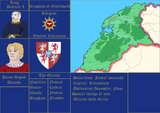Search Results
ID: Ty1hV/Wk/qst/6271040#6276651
7/18/2025, 10:15:13 PM
ID: PBhKDqrt/qst/6259847#6276647
7/18/2025, 10:09:51 PM
You quietly expected the deal, exchanging a pouch of coin for the intended deeds and land grants that were once part of the bishopric's lands.
It was a first step, a step towards gaining increased control over what was still a realm with strong, independent local lords, who were in no position to challenge you for now, but who might do so if you weren't careful.
As the summer of 1265 drew to a close, you decided to review your tenure as prince-regent after your installation. All in all, the realm had at least not been torn apart or been bankrupted on your watch. All the lords had been accepting of you for now, though their background grumbling had been noted thanks to cousin Markwart's gossiping.
The gentry, those lower men of lesser noble birth, known colloquially as junkers, had slowly started to warm to the presence of the kingdom; too poor to live off their estates, they had begun working for your infant bureaucracy as clerks, administrators, and tax collectors. While ordinarily you had relied on the local lords to collect taxes, with them taking a cut as their share of the taxes, within your demesne you had begun to bypass such practices in favour of paying such collectors a salary.
Relations with the church, by contrast, have been noticeably cool since the times of Archbishop Albrecht; the pontiff's meddling has soured opinions on the church within circles at court. However, you hope that this new bishop of Rittersbach might give you the opportunity to warm things once more, especially if he is as malleable as the canons who approached you would select him.
Where it came to the burghers, the estate had already enjoyed a most beneficial relationship with the crown dating back to the early days of your father's reign as a mere count. The kingdom had been free in its dealing and trade policy, and the merchants and craftsmen could conduct their business freely and safely. The bank of Rittersbach had, furthermore, given many an upstart merchant or tradesman the capital he needed to start his business, thanks to a model of long-term loans that the bank had set up to help promote commerce and industry. The guilds and city councils, likewise, had benefited from a relatively light hand in the rule of your father and, thanks to decades of wise stewardship, had been more than willing to accede to the reforms concerning the courts of justice.
All in all, Greifswald might not be the richest kingdom, nor the largest or most populous. But it has potential; migrants from Tautenland still come over to populate those lands left sparsely populated. The amber mines attract dwarves from the north and west; the halflings in the moorland have tilled the previously desolate land into a productive farmland. There had even been a few elves who had settled near the forest.
It was a first step, a step towards gaining increased control over what was still a realm with strong, independent local lords, who were in no position to challenge you for now, but who might do so if you weren't careful.
As the summer of 1265 drew to a close, you decided to review your tenure as prince-regent after your installation. All in all, the realm had at least not been torn apart or been bankrupted on your watch. All the lords had been accepting of you for now, though their background grumbling had been noted thanks to cousin Markwart's gossiping.
The gentry, those lower men of lesser noble birth, known colloquially as junkers, had slowly started to warm to the presence of the kingdom; too poor to live off their estates, they had begun working for your infant bureaucracy as clerks, administrators, and tax collectors. While ordinarily you had relied on the local lords to collect taxes, with them taking a cut as their share of the taxes, within your demesne you had begun to bypass such practices in favour of paying such collectors a salary.
Relations with the church, by contrast, have been noticeably cool since the times of Archbishop Albrecht; the pontiff's meddling has soured opinions on the church within circles at court. However, you hope that this new bishop of Rittersbach might give you the opportunity to warm things once more, especially if he is as malleable as the canons who approached you would select him.
Where it came to the burghers, the estate had already enjoyed a most beneficial relationship with the crown dating back to the early days of your father's reign as a mere count. The kingdom had been free in its dealing and trade policy, and the merchants and craftsmen could conduct their business freely and safely. The bank of Rittersbach had, furthermore, given many an upstart merchant or tradesman the capital he needed to start his business, thanks to a model of long-term loans that the bank had set up to help promote commerce and industry. The guilds and city councils, likewise, had benefited from a relatively light hand in the rule of your father and, thanks to decades of wise stewardship, had been more than willing to accede to the reforms concerning the courts of justice.
All in all, Greifswald might not be the richest kingdom, nor the largest or most populous. But it has potential; migrants from Tautenland still come over to populate those lands left sparsely populated. The amber mines attract dwarves from the north and west; the halflings in the moorland have tilled the previously desolate land into a productive farmland. There had even been a few elves who had settled near the forest.
Page 1
